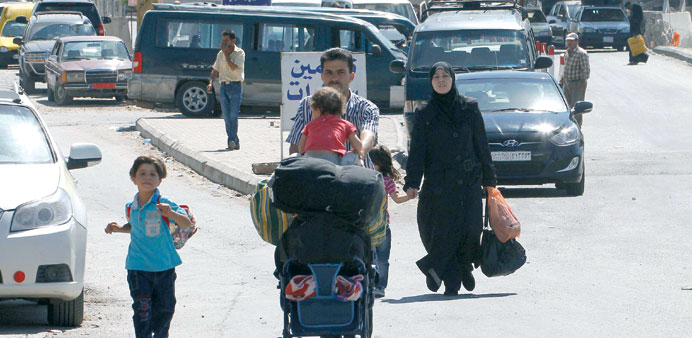As UN inspectors crossed the border from Syria into Lebanon yesterday, they were followed out of the war-torn country by a continuous flow of families desperate to flee the threat of US strikes.
Cars filled with weary-looking passengers, their open boots packed to the brim with bags and suitcases, crossed the Masnaa border post in a constant—though not massive—exodus as a US intervention over a suspected gas attack appeared imminent.
“I’m going to rent a house near Anjar (in Lebanon’s eastern Bekaa valley) and we will wait for things to calm down,” said Abu Malek, a 31-year-old Syrian who works in an aluminium factory near the capital Damascus.
Carrying a carton of supplies handed over by a Qatari NGO that welcomes Syrian refugees some 300m from the border post, he said people in his home country were “terrified”.
“Those who can, leave. But many people can’t.”
Most of those crossing the border had the means and money to do so. Not so for Aicha, a 60-year-old woman wearing a black veil, her lower jaw almost toothless.
Sitting in the shade with her daughter-in-law, she said she arrived on Friday to accompany her son who travelled on to Turkey to find work, and intended to return to Damascus if she could find transport.
“I’m scared, we’re all scared of US strikes, but what can we do? We are dependent on God,” she sighed.
“We are neutral in this war, we don’t understand anything about what is going on. We have lost our house and we are living with friends in another area.”
Majida, her 33-year-old daughter-in-law, added that they would like to stay in Lebanon.
“But we don’t have any money, we have nowhere to go. So we have to go back,” she said.
For almost a year, the Qatari NGO Al Asmah has set up a centre in Masnaa to welcome Syrian refugees.
Flashing their Syrian identity cards, refugees are able to get cartons of food and other useful items.
“Over the past few days, since the US threats, the number of families that we see has doubled,” said director Omar Mohamed Koeis.
“We now provide for 60 to 70 families a day.”
In a nearby parking lot, Amer Abed, a 27-year-old unemployed man who came from a Damascus suburb, was emptying the contents of the overflowing boot of an old Mercedes car into a van.
Weary women got out of the car, holding young, surprised-looking children in their arms.
“I want these US strikes to happen,” he said to several foreign journalists.
“You journalists, and the entire world, are watching our country go up in flames without doing anything. Hate has taken over our hearts.
“I want these strikes because if Americans attack us and kill us once and for all, then maybe the Arabs will unite to defend us.”
Rebels plan raids to exploit Western strikes: commander
Opposition fighters across Syria are preparing to launch attacks that exploit anticipated US-led military strikes, but there are no plans to co-ordinate with Western forces, a Syrian rebel commander said yesterday.
Qassim Saadeddine, a former Syrian army colonel and spokesman for the rebels’ Supreme Military Council, said the council had sent a selection of rebel groups a military plan of action to use if strikes took place.
“The hope is to take advantage when some areas are weakened by any strikes. We ordered some groups to prepare in each province, to ready their fighters for when the strike happens,” he told Reuters, speaking by Skype.
“They were sent a military plan that includes preparations to attack some of the targets we expect to be hit in foreign strikes, and some others that we hope to attack at the same time.”
The Supreme Military Council is the armed wing linked to the National Coalition, an umbrella group considered to be the opposition’s political leadership abroad.
Saadeddine said the plans had been prepared without any help from foreign powers. He said no information had been offered to them by the US or any other Western countries such as France, which has supported carrying out a strike on Assad.
“The US considers us to be one of the two parties engaged in a civil war, they haven’t spoken to the rebel leadership at large, though they have communicated to the political leaders in the Coalition,” Saadeddine said. “There may have been consultations with the head of our council, Salim Idriss, but I cannot confirm this.”

